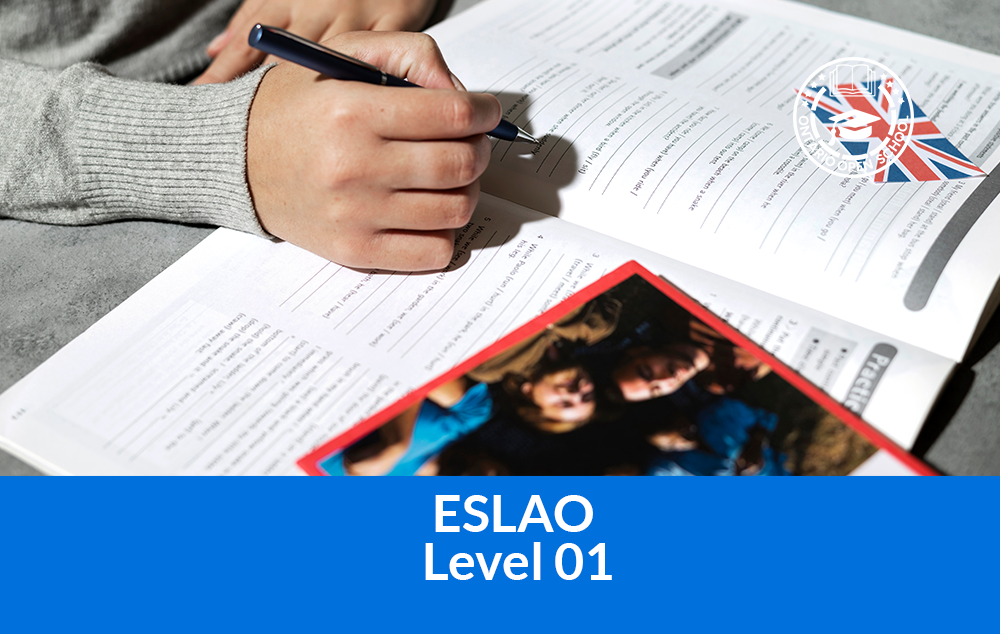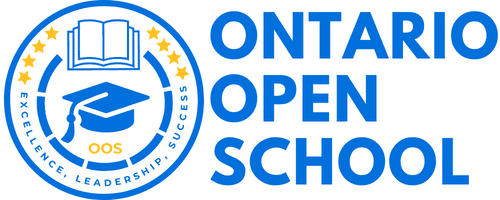- info@ontarioopenschool.com
- 647-494-4499
-
Unit 100 - 29 Gervais Drive, North York, ON.
M3C 1Y9
Copyright 2024 Ontario Open School Inc. All Rights Reserved.
This course builds on students’ previous education and language knowledge to introduce them to the English language and help them adjust to the diversity in their new environment. Students will use beginning English language skills in listening, speaking, reading, and writing for everyday and essential academic purposes. They will engage in short conversations using basic English language structures and simple sentence patterns; read short adapted texts; and write phrases and short sentences. The course also provides students with the knowledge and skills they need to begin to adapt to their new lives in Canada.
Unit Order | Unit Name | Suggested Time |
|---|---|---|
| Unit 1 | All About Me *Assignments are ongoing throughout the course. Topics: My dreams and Ambitions Strategies/Resources for Success Assignments and Tests: Assignment 1 – *Reflection Journal 1 (daily vocabulary, grammar and reflection) Writing Conventions Test (1) Grammar: Subject | 24 hours |
| Unit 2 | Canadian Mannerisms Topics: Responding to Teachers and Peers Non-Verbal Communication Assignment 2 – “The Hitchhiker” Worksheet (daily vocabulary, grammar and reflection) Assignments and Tests: Teacher-Student Simulations of Conversation Grammar: Count: singular and plural, regular/irregular nouns | 33 hours |
| Unit 3 | Canadian Elements Topics: Canadian Geography Assignments and Tests: Assignment 3 – An Oral Presentation and a 1 Page Report on “A, An, and the” Writing Conventions Test (3) Grammar: Cardinal Numbers | 33 hours |
| Unit 4: | Media Knowledge and Skills Via a Thousand Splendid Suns Topics: Types of Media Understanding A Thousand Splendid Suns Via the Media Assignments and Tests: Assignment 4 – Reflection Journal 2 Assignment 5 – A Letter Writing Conventions Test (4) Grammar: Adverbs to modify adjectives | 20 hours |
| Exam Review and Final Evaluation | Written and oral examination
| 20 hours |
| Total | 110 Hours |
A variety of strategies are used to allow students many opportunities to attain the necessary skills for success in this course. The teacher uses a variety of whole class, small group and individual activities to facilitate learning. The following is a list of specific teaching/learning strategies that the teacher may use but is not limited to:
| Course Specific | Language | Collaborative |
|
Direct teaching Teaching notes Work and tasks sheets Homework Independent reading Independent study Information Analysis Research Portfolio Reflection Presentation Decision making Organizational Diagrams Peer/Self Evaluation |
Oral presentation Class Discussion Small group discussion Teacher-student conferencing Peer-evaluation Personal response notes Reading and answering questions
|
Cooperative learning Peer-evaluation Brainstorming Group discussion Student-teacher conferencing |
Purpose
The primary purpose of assessment is to improve student learning. Assessment relates directly to the expectations for the course.
A variety of assessments for and as learning are conducted on a regular basis to allow ample opportunities for students to improve and ultimately demonstrate their full range of learning and for the teacher to gather information to provide feedback. Assessment tasks relate to the success criteria set out in lesson plans. Success criteria allow students to see what quality looks like.
Evaluation is the process of judging the quality of student work in relation to the achievement chart categories and criteria and assigning a percentage grade to represent that quality. Evaluation is based on gathering evidence of student achievement through:
Assessment for Learning – we provide feedback and coaching. Assessment FOR Learning is the process of seeking and interpreting evidence for the use of learners and their teachers to decide where the learners are in their learning, where they need to go, and how best to go there.
Assessment as Learning – we help students monitor progress, set goals, reflect on their learning
Assessment AS Learning is the process of the explicit fostering of students’ capacity over time to be their own best assessors, but teachers need to start by presenting and modeling external, structured opportunities for students to assess themselves.
Assessment of Learning – we use assessments to provide evaluative statements about student achievement. Assessment OF Learning is the assessment that becomes public and results in statements of symbols
(marks/grades/levels of achievement) about how well students are learning. It often contributes to pivotal decisions that will affect students’ future.
ASSESSMENT TOOLS
| Assessment as Learning | Assessment for Learning | Assessment of Learning |
|
Student Product
ü Journals (checklist) ü Assessment Quiz (scale/rubric) ü Questionnaires (checklist) ü Ticket In Cards (anecdotal)
|
Student Product
ü Assignment ü Pre-tests (scale/rubric) ü Quizzes (scale/rubric) ü Rough drafts (rubric) ü Portfolios (rubric) ü Peer feedback (anecdotal/checklist) ü Exit Cards/Reflections (anecdotal) ü KWL (anecdotal) ü Vocabulary Logs (anecdotal) |
Student Product
ü Assignment ü Tests (scale/rubric) ü Exam ü Reports/response (rubric) ü Final Reflection (scale/rubric) |
|
Observation ü Whole class discussions (anecdotal) ü Self-proofreading (checklist)
|
Observation
ü Class discussions (anecdotal) ü Performance tasks (anecdotal/scale) |
Observation ü Presentation (rubric)
|
|
Conversation ü Student teacher conferences (checklist) ü Small Group Discussions (checklist) ü Pair work (checklist) ü Debate (anecdotal)
|
Conversation
ü Student teacher conferences (checklist) ü Small group discussions (checklist) ü Pair work (anecdotal) ü Peer-feedback (anecdotal) ü Oral pre-tests (scale/rubric) ü Oral quizzes (scale/rubric) ü Debate (Anecdotal) |
Conversation ü Student teacher simulation (checklist) ü Oral Test (scale/rubric)
|
Unit 1:
| Assessment For Learning (AFL) | K/U | T | C | A |
| Participation in Group Activities | X | X | X | |
| Class Discussions | X | X | X | X |
| Cartoon Story | X | X | X | |
| Sequence Story | X | X | X | |
| Response Journals (with prompts) | X | X | X | |
| Graphic Organizer | X | X | X | X |
| Group Story-telling | X | X | X | |
| Assessment As Learning (AAL) | ||||
| Conferencing | X | X | ||
| Reflection/Self-Assessment | X | X | X | X |
| Vocabulary Quizzes | X | X | X | |
| Read Alouds X XX | ||||
| Assessment Of Learning (AOL) | ||||
|
Story-telling Autobiography Assignment |
X
X |
X
X |
X
X |
X X |
| Test | X | X | X | X |
| Report/response (rubric) | X | X | ||
Unit 2:
| Assessment For Learning (AFL) | K/U | T | C | A |
| Brainstorming | X | X | X | |
| Vocabulary List | X | X | ||
| Response Journals | X | X | X | |
| Exit Tickets | X | X | ||
| Canada’s Services Graphic Organizer | X | |||
| Entrance Tickets | X | X | ||
| Assessment As Learning (AAL) | ||||
| Peer Assessment | X | X | X | |
| Self-Assessment | X | X` | X | |
| Quiz | X | X | X | |
| Questionnaires (checklist) | X | X | X | |
| Assessment Of Learning (AOL) | ||||
| Canada Poster (Rubric) | X | X | X | X |
| Tests | X | X | X | |
|
Reports/response (rubrics) Final Reflection |
X
X
|
X
X
|
X
|
X
|
Unit 3:
| Assessment For Learning (AFL) | K/U | T | C | A |
| Anticipation Questions | X | X | ||
| Paragraphs | X | X | ||
| Graphic Organizers | X | X | X | |
| Literature Circle Activities | X | X | X | X |
| Response Journals | X | X | X | |
| K-W-L (anecdotal) | X | X | ||
| Peer-feedback (anecdotal/checklist) | X | |||
| Assessment As Learning (AAL) | ||||
| Self-Assessment of Participation in Role-Play | X | X | ||
| Peer-Assessment | X | X | ||
|
Quizzes Questionnaires |
X | X | X
X |
|
| Assessment Of Learning (AOL) | ||||
| Problem-Solving Role Play (Rubric) | X | X | X | X |
| Completion of Literature Circle Roles/Activities | X | X | X | X |
| Final Reflection | X | X | ||
Unit 4:
| Assessment For Learning (AFL) | K/U | T | C | A |
| Reading Activities | X | X | ||
| Media Clips – Listening Comprehension and Discussion | X | X | X | |
| Graphic Organizers | X | X | X | X |
| Report – Draft | X | X | ||
| K-W-L (anecdotals) | ||||
| Assessment As Learning (AAL) | ||||
| Peer Editing | X | X | X | X |
| Self-Editing/Assessment | X | X | X | X |
|
Entrance Tickets Exit Tickets |
X
X |
X
X |
||
| Assessment Of Learning (AOL) | ||||
| Report and final reflection – Final Copy | X | X | X | X |
Resources
English, YES! Level 1: Basic (McGraw-Hill)
English, YES! Level 2: Introductory (McGraw-Hill)
Language Handbook: Support for the Language Handbook, Harcourt Education (Holt, Rineheart and Winston)
Growing Success: Assessment Evaluation and Reporting in Ontario Schools, First Edition Covering Grades 1-12
Grading
Weighting of categories
| Knowledge/Understanding | Thinking/Inquiry | Communication | Application |
| 25% | 25% | 25% | 25% |

Course Grade | ESL |
|---|---|
Course Code | ESLAO |
Course Category | English As A Second Language (ESL) |
Course Type | Open |
Course Delivery | Online |
Course Duration | 8hrs |
Course Credit | 0 |
Copyright 2024 Ontario Open School Inc. All Rights Reserved.
